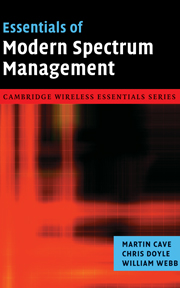Book contents
- Frontmatter
- Contents
- Acknowledgements
- I Emerging problems with the current spectrum management approach
- II Markets
- 4 Market solutions
- 5 Auctions
- 6 Spectrum trading: secondary markets
- 7 Technical issues with property rights
- 8 Economic issues with property rights
- 9 Competition issues relating to spectrum
- 10 Band management
- III Regulation
- IV Conclusions
- Further reading
- Abbreviations
- Author biographies
- Subject index
- References
5 - Auctions
Published online by Cambridge University Press: 13 August 2009
- Frontmatter
- Contents
- Acknowledgements
- I Emerging problems with the current spectrum management approach
- II Markets
- 4 Market solutions
- 5 Auctions
- 6 Spectrum trading: secondary markets
- 7 Technical issues with property rights
- 8 Economic issues with property rights
- 9 Competition issues relating to spectrum
- 10 Band management
- III Regulation
- IV Conclusions
- Further reading
- Abbreviations
- Author biographies
- Subject index
- References
Summary
Introduction
Over the course of time radio spectrum administrators have applied many different ways to assign radio spectrum rights to users. Until the late 1980s administrators assigned licences using administrative processes that included lotteries, beauty contests and awards on a first-come first-served basis. In the early 1990s a few administrators chose to auction spectrum rights, and following the large revenues raised in auctions for mobile telecommunications spectrum rights in the United States in the mid 1990s, interest in using auctions to assign frequency rights increased markedly around the world.
In the 1990s auctions appealed to some radio administrators, as it was felt an assignment process based upon market signals would reflect more accurately the value of spectrum and lead to more efficient use of spectrum, see FCC [1]. Advocates of auctions have long argued strongly that the outcomes in well-designed auctions are better for society than administrative procedures. It is widely argued that the superiority of auctions stems from their objectivity and transparency.
Some radio spectrum administrators believe auctions ensure that the frequency rights go to those who should best own them because frequencies are typically granted to those willing to bid the highest amount. In competitive market economies, scarce resources are allocated efficiently if they flow to those willing to pay the highest amount and radio spectrum is no different to any other scarce resource in this respect.
Nevertheless, the application of auctions as a mechanism to assign frequency rights has been challenged.
- Type
- Chapter
- Information
- Essentials of Modern Spectrum Management , pp. 43 - 84Publisher: Cambridge University PressPrint publication year: 2007

